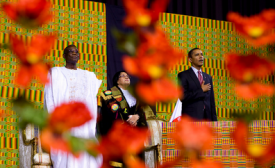africa

On Sunday, September 22, 2013, al-Shabab, a Somali-based al Qaeda cell unleashed gunfire on a Kenyan shopping mall, murdering 72 people and injuring over 200 others. The deadliest terrorist attack in Kenya since the 1998 bombing of the U.S. Embassy in Nairobi, the Kenyan mall shooting temporarily brought Africa to the forefront of U.S. news organizations like CNN, MSNBC, and Fox, who typically ignore the continent.
Ottawa has dismantled a key task force aimed at supporting the peace process in Sudan at a time of renewed fighting in Darfur, raising questions about Canada’s commitment to aid and diplomacy in the conflict-torn region.
Africa is now home to 55 billionaires, up from previous estimates of 16-25 billionaires, new research has found. These super rich are worth a combined total of $143.88bn (£89.27bn). The UK, in contrast, is home to 84 billionaires, worth a nearly £250bn, according to the 2013 Sunday Times Rich List.
This weekend, the United States conducted two raids against militant Islamists in Tripoli, Libya and Barawe, Somalia. Though the action in Tripoli appeared to be more successful—FBI and CIA agents nabbed Abu Anas al-Liby, a suspected leader of Al Qaeda—the significance of both raids lies less in their immediate success and more in their implications for American involvement in Africa.
There is a growing view both from Nairobi and the cloistered, heavily defended corridors of Villa Somalia – the Somali government’s main compound here in Mogadishu – that al-Shabab’s Westgate Mall attack was an act of desperation. It was, says the theory, a lashing out by a movement on the ropes; a last-ditch attempt to prove its legitimacy and win supporters in the face of continued military pressure on the ground, a brutally damaging internal power-struggle, and a growing sense of irrelevance abroad.
A group of young Colombian musicians known as “Cantares del Pacifico” is crossing the Atlantic for five days in a cultural exchange of music and dance with the west African nation of Ghana. The visit comes after opening diplomatic relationship between the two countries following the establishment of shared embassy between Colombia, Mexico, Chile and Peru in Ghana under the Cali Declaration made in recent accord with the Pacific Alliance.
Internet access was officially declared a right by the UN in 2011, eight years after the World Summit Information Society first met in 2003. Among their goals was to address the global digital divide; to "improve access to information and communication infrastructure and technologies as well as to information and knowledge; build capacity; increase confidence and security in the use of ICTs; create an enabling environment at all levels; develop and widen ICT applications." Despite this, a decade later, 68% of the world does not have access to internet.
Gao, the largest city in northern Mali, is a place of extremes. It’s a sprawl of one- and two-story mud-brick houses that lack power lines and running water, but it’s also home to the garish, McMansion-style estates of Cocainebougou, or “Cocaine Town,” a deserted neighborhood that once belonged to Arab drug lords who controlled the region’s smuggling routes for hashish and cocaine but fled, fearing reprisals from local citizens who blamed them for the Islamist invasion.







